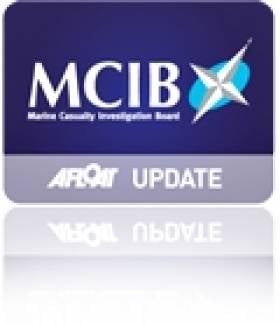Displaying items by tag: incident
Ro-Ro Freight-Ferry on Ireland-Belgium Route Towed to Safety after Losing Power Near Wolf Rock Lighthouse off Cornwall
A ro-ro freight-ferry which departed Cork Harbour lost power and ended up grounded near the Wolf Rock lighthouse off Cornwall, has been towed to safer waters off Falmouth.
The 31,140-tonne Mazarine operated by CLdN had sailed from Ringaskiddy and was bound for Zeebrugge, Belgium, however on Monday the ro-ro vessel when in the Celtic Sea became stranded near the Wolf Rock lighthouse nine miles off the coast of Cornwall.
According to the coastguard they were alerted to the situation of the 2009 built ro-ro at about 9.10am. Two lifeboats from the RNLI stations based at Sennen Cove and Penlee went to the scene of the grounding Maltese flagged vessel which has a 250 freight-trailer capacity.
During a passage of the Isle of Scilly ferry-cargoship Scillonian III from Penzance to the archipelago, the passenger ferry was alerted of the incident in case anyone needed to be evacuated.
In addition a coastguard helicopter was also deployed.
According to CornwallLive yesterday, 11 July, the 195m long vessel was re-floated and drifting for several hours under a lifeboat escort, with the ship towed by a tug to waters off Falmouth.
As BBC News also reported the Maritime and Coastguard Agency (MCA) said it would remain there while a decision was made on what to do next.
The Luxembourg based ship operator, CLdN Ro Ro S.A. said that all the 22 crew and three passengers on board the vessel were safe and unharmed.
More on the incident here.
Safety Advice for Leisure Boaters in MCIB's Helvick Head Report
#MCIB - The Marine Casualty Investigation Board (MCIB) has called for better safety awareness among leisure boat users in its report into the deaths of two men off Helvick Head in Co Waterford in May 2010.
John O'Brien and Pat Esmonde were lost overboard from their small RIB on 23 May 2010, and their remains were recovered two days later. Post-mortems confirmed that both died by drowning.
The report does not conclude exactly how the incident occurred. But accounts from eyewitnesses who sighted the men in the minutes before state that neither was wearing a lifejacket, despite the legal requirement to do so - and despite O'Brien having no seafaring experience and Esmonde being unable to swim, as confirmed by their families.
The MCIB also noted that while there were two lifejackets aboard the vessel, they were for emergencies and not suitable for constant wear as per the requirements for the vessel class.
Other safety issues highlighted include the kill-cord on the engine, which was not being used, and the fact that the initial distress call was made by mobile phone and not VHF radio.
Though neither had any bearing on this specific incident, the MCIB warned in particular that mobile phone calls are closed in nature, whereas VHF distress calls can be heard and answered by any vessel in the vicinity.
The board recommends that the Minister for Transport "undertakes a highly visible information poster campaign on piers and launching areas relating to lifejackets, VHF radio and emergency contact details" and also reminds boaters of their legal obligations.
The full report is available to download as a PDF from the MCIB website HERE.
Probe into Death of Seaman at Waterford Port
An investigation has been launched into the death of a seaman in Waterford Port yesterday.
The Irish Independent reports that the 51-year-old sailor from the Philippines fell more than five metres after being struck by machinery.
He had been tying down a load on the cargo ship MV Scot Pioneer when the incident occurred around lunchtime yesterday. He later died from his injuries.
The Health and Safety Authority and gardaí went to the scene, and RTÉ News reports that a post-mortem was set to take place yesterday afternoon.
The Port of Waterford Company also issued a statement extending its sympathies to the man's family and colleagues.






























































